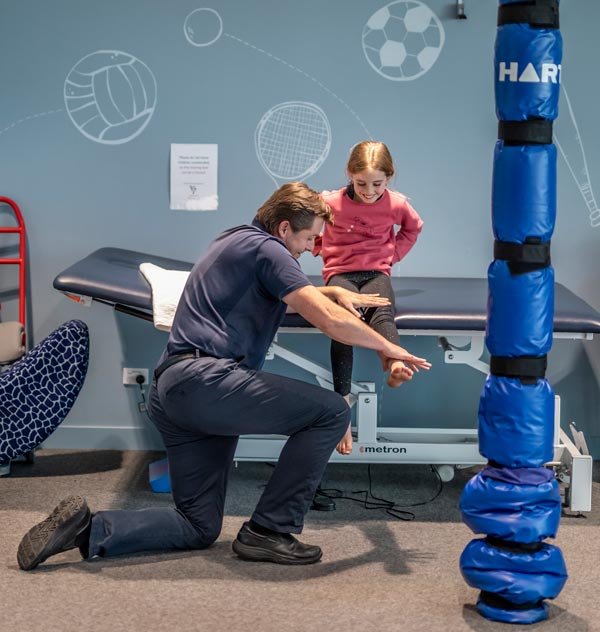The Importance of Physiotherapy: How It Plays a Vital Duty in Rehab
Physiotherapy is a critical component of recovery, important for bring back physical function and promoting overall wellness. It utilizes a multidisciplinary method customized to specific needs, dealing with both physical and emotional aspects of healing. The duty of physiotherapy prolongs beyond simple discomfort relief; it promotes freedom and empowers clients. Recognizing its impact on different conditions discloses a deeper importance that necessitates exploration. What lies underneath the surface of this healing technique?
Understanding the Function of Physiotherapy in Rehab
Although lots of might view physical rehabilitation as simply a treatment for injuries, it plays an important function in the wider context of recovery. Physiotherapy encompasses a multidisciplinary approach, focusing not only on physical recovery but also on improving total health. It assists people in reclaiming functional abilities, improving flexibility, and restoring freedom following surgery, ailment, or trauma.Therapists assess each patient's unique requirements and develop customized treatment plans, including exercises, hand-operated treatment, and education. This individualized technique fosters person empowerment, urging active participation in their rehabilitation journey. Additionally, physiotherapy addresses emotional facets, providing assistance that can reduce anxiety and advertise motivation.
Advantages of Physiotherapy for Injury Healing
Physiotherapy offers substantial benefits for individuals recouping from injuries, mainly through reliable pain monitoring strategies. These strategies not only reduce discomfort but likewise facilitate boosted mobility restoration. By dealing with both discomfort and motion, physiotherapy plays an important duty in the overall recovery process.
Discomfort Management Techniques
Reliable pain administration techniques play a vital function in the rehabilitation process, especially for people recuperating from injuries. Physiotherapy offers different approaches to reduce discomfort, making it possible for patients to engage better in their recuperation. Techniques such as hands-on therapy, including mobilization and control, can reduce discomfort and improve cells recovery. Furthermore, methods like ultrasound and electric stimulation offer targeted discomfort alleviation and advertise tissue fixing. Workout treatment, tailored to individual requirements, enhances muscular tissues and improves feature while also dealing with pain. Education and learning on posture and body technicians further empowers patients to take care of discomfort proactively. By including these methods, physiotherapy not only reduces discomfort but likewise promotes a more positive rehabilitation experience, eventually aiding in the trip in the direction of recovery.
Enhanced Movement Restoration
Restoring wheelchair is a crucial goal in the rehab procedure complying with an injury (pediatric physiotherapy). Physiotherapy plays an essential role in this aspect by employing targeted exercises, hand-operated treatment, and techniques created to enhance movement and feature. Through individualized therapy strategies, physiotherapists evaluate private constraints and establish methods to overcome them, advertising quicker recovery. Strategies such as extending, reinforcing, and useful training contribute to restoring range of activity and stability. Additionally, physio therapists educate people on body auto mechanics and pose, which are necessary for preventing future injuries. The all natural technique of physical rehabilitation not only aids in physical recuperation however also improves confidence, making it possible for people to return to their everyday activities and enhance their total quality of life. Boosted mobility is a keystone of effective recovery
Physiotherapy Techniques and Techniques
Various methods and strategies exist within the domain of physical rehabilitation, each is designed to attend to certain individual requirements and problems. Manual treatment, for example, entails hands-on methods to reduce pain and boost wheelchair. This technique consists of joint mobilization and soft tissue manipulation, targeting muscular tissue tension and joint stiffness.Exercise treatment is another widespread approach, concentrating on tailored workout routines to enhance stamina, flexibility, and endurance. This strategy is often incorporated with person education and learning to advertise self-management and lasting recovery.Additionally, methods such as heat, chilly, ultrasound, and electrical stimulation are made use of to decrease swelling and accelerate healing.Lastly, water treatment supplies an unique atmosphere where individuals can execute exercises with reduced pressure on their bodies, improving rehabilitation results. Each of these techniques is purposefully used, guaranteeing that the rehab procedure is both reliable and personalized for suitable healing.

The Effect of Physiotherapy on Persistent Conditions
Physiotherapy plays a necessary function in handling chronic problems by effectively addressing discomfort, enhancing mobility, and improving overall feature. Through customized interventions, individuals can experience a reduction in discomfort and a higher capability to carry out daily activities. Furthermore, physical rehabilitation aids to stop additional problems, contributing to long-term health and wellness and wellness.
Taking Care Of Pain Efficiently
Chronic pain can significantly diminish lifestyle, triggering people to seek reliable monitoring methods. Physiotherapy plays an important role in relieving discomfort related to various persistent conditions. Via targeted exercises and hand-operated treatment methods, physio therapists aid clients improve their discomfort degrees and functionality. They employ techniques such as heat, cold, and electrical stimulation to minimize pain and promote recovery. Additionally, education on posture and body technicians enables clients to handle their pain separately. By promoting a much better understanding of their problem, individuals can create coping mechanisms that improve their total well-being. Eventually, physical rehabilitation not only addresses discomfort straight but also equips people to take an energetic role in their rehab trip, resulting in lasting discomfort management services.
Enhancing Flexibility and Feature
Managing pain successfully is usually a forerunner to improving mobility and function in individuals with chronic conditions. Physiotherapy utilizes targeted exercises and techniques, which can considerably improve joint adaptability, muscular tissue toughness, and total physical capacities. By concentrating on tailored rehabilitation programs, physiotherapists intend to bring back suitable motion patterns and minimize physical limitations. These interventions not only alleviate discomfort yet also empower patients to reclaim self-reliance in day-to-day tasks. On top of that, physical rehabilitation addresses the psychological elements of chronic conditions, promoting a favorable attitude that motivates active participation in healing. As individuals advance via their rehab trip, the cumulative results of boosted movement result in boosted quality of life, allowing them to involve more totally in their personal and social environments.
Stopping Additional Problems
Although lots of people with chronic problems encounter the threat of further problems, targeted physiotherapy interventions can play a vital role in alleviating these risks. By concentrating on customized exercise programs, physiotherapists help patients improve strength, adaptability, and endurance, which are essential in avoiding secondary problems such as joint pain, muscle degeneration, and reduced mobility. Furthermore, physiotherapy informs patients regarding their problems, encouraging them to manage signs effectively. Routine sessions likewise advertise adherence to rehabilitation procedures, decreasing the probability of medical facility readmissions. Making use of techniques such as manual therapy, techniques, and useful training, physical rehabilitation addresses specific demands, ultimately enhancing total wellness end results. In doing so, it not just help recovery but also fosters a proactive method to lasting health for people with chronic problems.

The Significance of Personalized Therapy Strategies
Just how can individualized treatment plans improve the effectiveness of physical rehabilitation in rehab? Tailoring treatment plans to the private demands of clients notably enhances outcomes. Everyone presents one-of-a-kind physiological features, case histories, and recovery goals. Customized strategies take these aspects into account, allowing physio therapists to develop specific treatments that target the underlying concerns more effectively.By using analyses that recognize the person's staminas and restrictions, physiotherapists can produce a roadmap for recovery. This individualized method promotes individual involvement, as people feel a lot more bought their therapy. Additionally, personalized strategies can cause quicker recuperation times, decreasing the danger of re-injury or complications.Incorporating comments systems enables continuous modifications to the treatment plan, guaranteeing it stays lined up with the person's progression. Inevitably, individualized treatment intends not just enhance the performance of physiotherapy yet likewise advertise an alternative approach to recovery, dealing with both physical and psychological aspects of recuperation.

Success Stories: Real-Life Influence of Physiotherapy
As people begin on their recovery journeys, the transformative results of physical rehabilitation typically emerge with compelling success stories. A middle-aged guy recouping from a knee substitute located renewed wheelchair and check independence via targeted physiotherapy sessions. Originally having a hard time to stroll, he gradually restored toughness and self-confidence, eventually going back to his favored activities.Similarly, a young athlete, sidelined by a severe ankle injury, experienced exceptional recuperation thanks to an individualized physical rehabilitation program. With specialized support, he not just returned to competitive sports see this however likewise improved his performance, showing the capacity for physiotherapy to exceed initial recovery goals.These narratives emphasize the extensive effect physiotherapy can have on individuals' lives. They highlight how tailored treatments, directed by knowledgeable specialists, assist in not just physical healing but also psychological resilience, enabling clients to reclaim their lives and pursue their desires with restored vigor. Such success stories offer as effective affirmations to the worth of physical rehabilitation in rehab.
Regularly Asked Questions
How much time Does a Regular Physiotherapy Session Last?
A normal physiotherapy session lasts in between 30 to 60 mins. The duration usually depends on the specific demands of the individual, the complexity of the therapy plan, and the sort of treatment being provided.

What Credentials Should a Physio therapist Have?
A competent physio therapist normally holds a relevant level in physiotherapy, that includes both theoretical and practical training. Furthermore, they commonly possess licensure or accreditation, guaranteeing adherence to expert requirements and continuous education and learning in their field.
Is Physiotherapy Painful or Uncomfortable?
The concern of whether physical rehabilitation is agonizing or unpleasant varies among people. Some might experience pain throughout treatment, while others locate it helpful. Inevitably, it relies on individual resistance and the particular problem being attended to.
Just how Often Should I Go To Physiotherapy Sessions?
Figuring out the frequency of physical rehabilitation sessions varies based on specific demands, injury seriousness, and treatment objectives. Normally, going to sessions one to three times weekly prevails, but a healthcare professional must lead the choice.
Will My Insurance Policy Cover Physiotherapy Treatments?
Many individuals ask whether their insurance coverage will certainly cover physiotherapy treatments (physiotherapist hamilton). Coverage differs substantially by copyright you can try this out and plan, so it is suggested for people to consult their insurance coverage or contact their provider straight for precise info